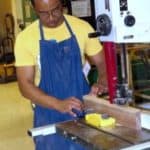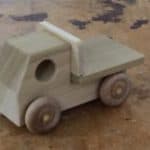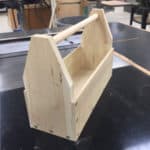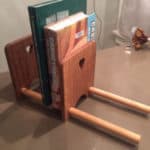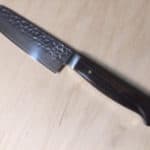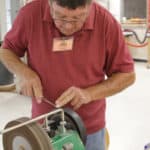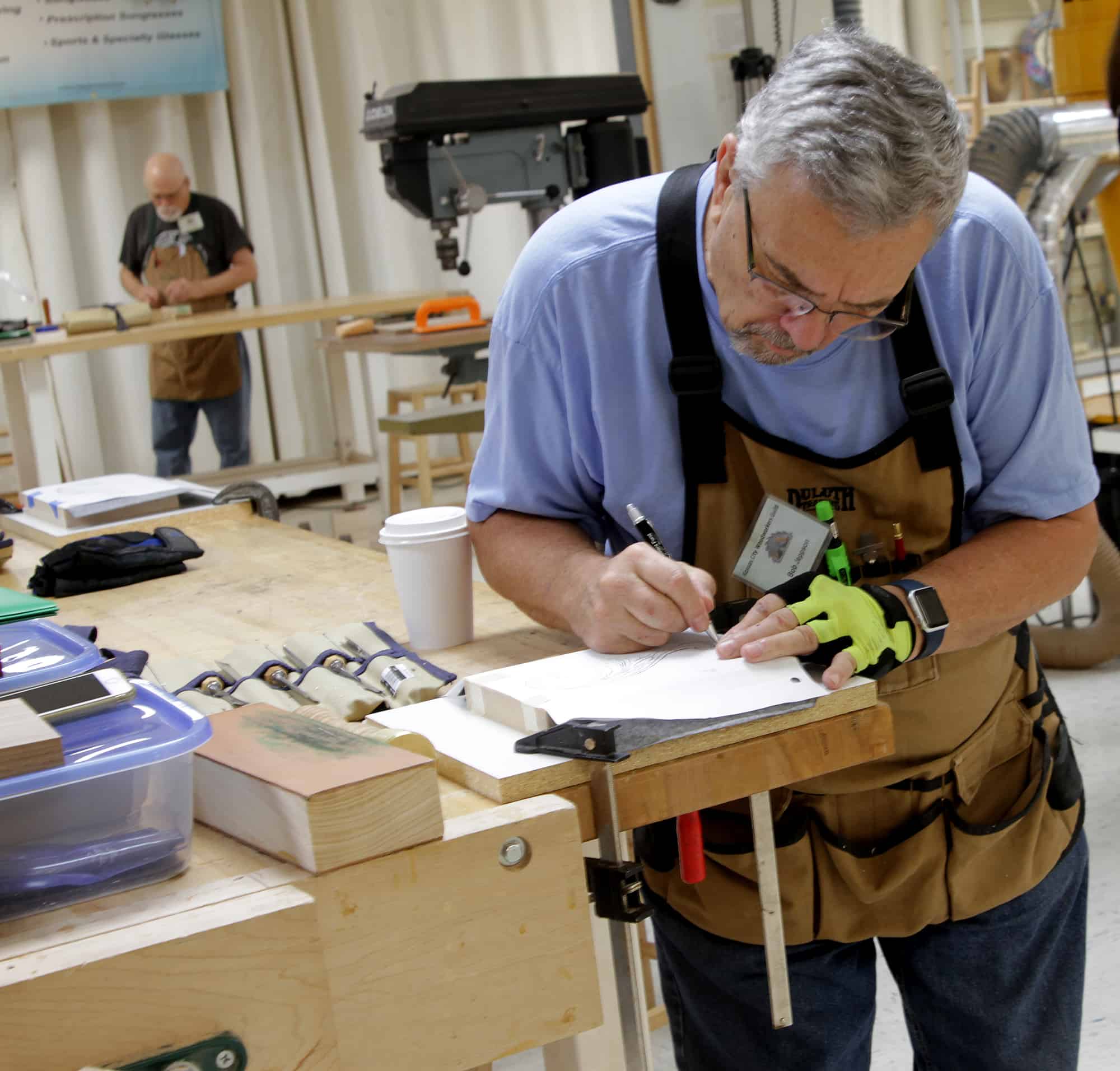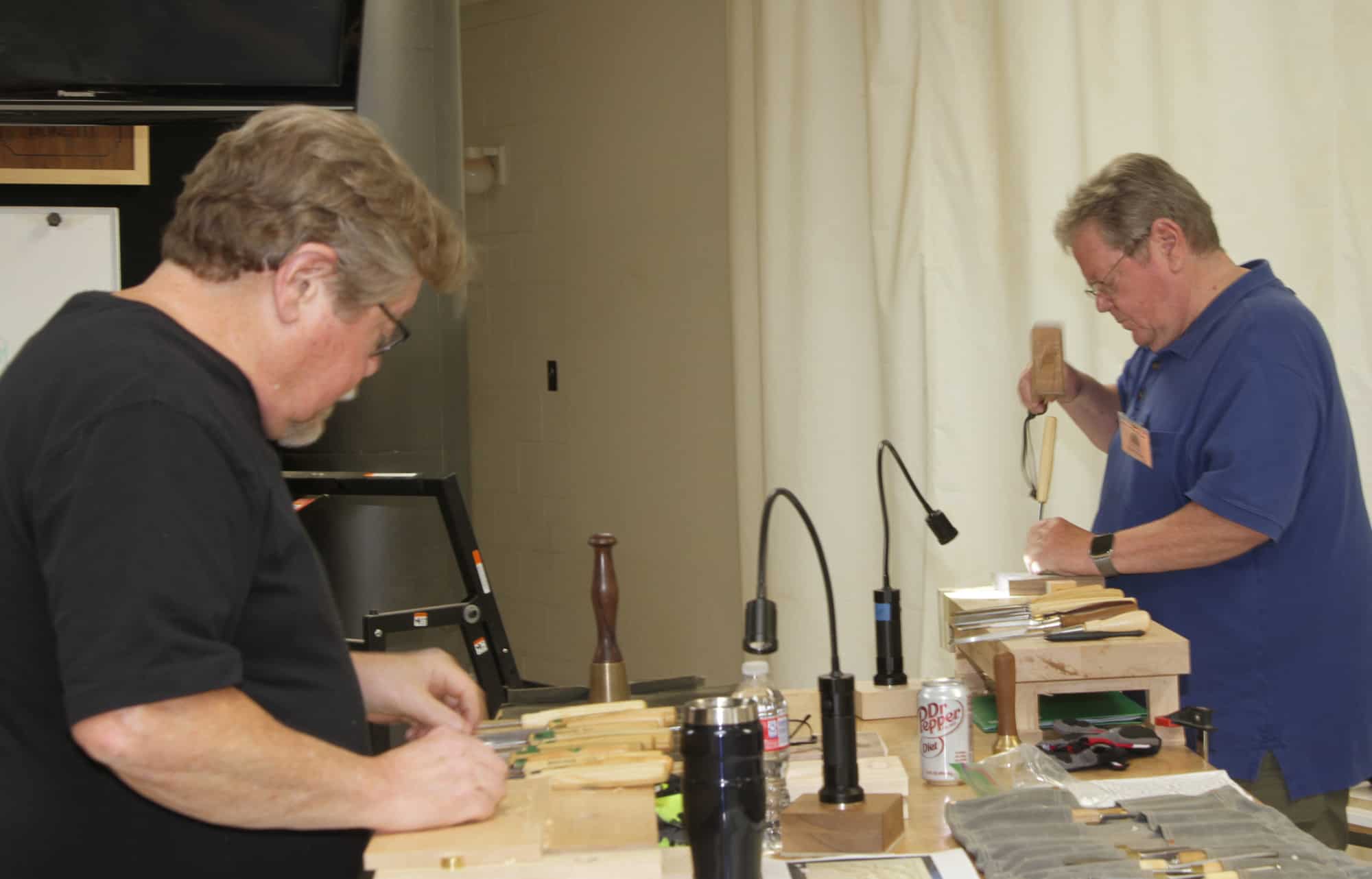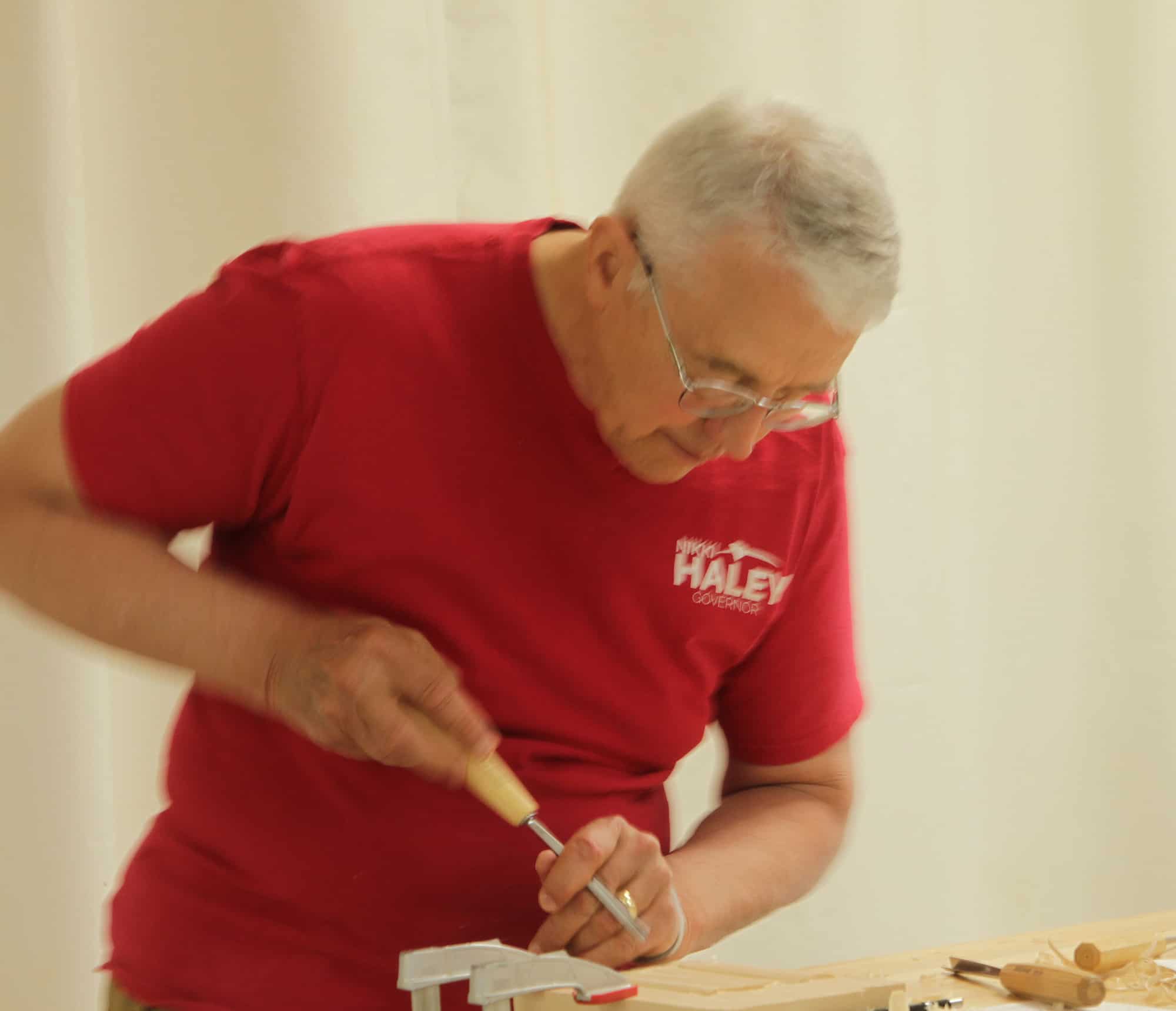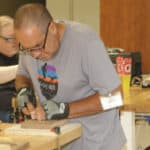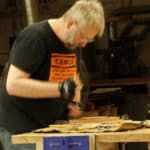Classes and Training
All Classes Require Guild Membership
Repeating Classes
Instructors: Kathryn Dingley, Ron Haw, Alex Moseley, George Rexroad, Alex Scott, John Sloss, Tom Smoller, Ed Stewart, and Tom Vece.
Date/Time: Classes usually occur 2-3 times per week (Dates will be provided upon completion of the safety test). Classes typically last 5-6 hours depending on the skill level and learning style of the student.
Class Size: Each class pairs 1 or 2 students with a qualified instructor.
Fee: For this class you must use the Guild’s payment processor attached to the Sign-Up.
- Sawdust Maker: $50.00
- WW+/Benefactor (-%20): $40.00
Green TAG: NOT REQUIRED – Completion of the Rough to Ready class will qualify the member for their Green Tag.
Note: The Safety Test must be passed by %90 or above before signing-up for this course.
Location: KCWG shop; 1717 Washington, Kansas City, MO 64108
You must meet the class prerequisites before you sign up for this class*.
Description: This class will be the first hands-on step in becoming a real, safe woodworker! Set up and safely use a comprehensive array of 10 top-quality woodworking machines – sliding compound miter saw, radial arm saw, jointer, thickness planer, table saws (rip, crosscut and dado), re-saw bandsaw, wide belt sander, and router table. In this process, transform a Rough, straight-from-the-sawmill piece of hardwood into a beautiful little 5×9 mitered-corner box, Ready for application of finish at home.
This class will serve as an alternative process to satisfy the safety requirements necessary to get your Green Nametag.
*Because this class can lead to your safety certification (Green Tag), a Green Tag is not initially required to participate. It will be necessary, however, for those without a Green Tag to complete the Safety Test and to complete and provide the Guild’s signed Liability Waiver.
Members who do not have a Green Card should contact the R2Rgroup@kcwg.net for further instructions
Members who already have earned their Green Tag and wish to take the class should contact the R2Rgroup@kcwg.net for instructions.
Guild Instructor(s): The KCWG Training Team
Class Level: Basic
Sessions: 10
Day(s) / Date(s) / Time(s):
All class times will be on Thursdays from 7:00pm – 10:00pm.
Session 1 – Class has concluded for this session
- Classes started on January 23, 2025, and ended on March 27, 2025.
- There were 10 class meetings over a 10-week period.
- Sign Up for this FIRST session was posted to the membership on Tuesday December 10, 2024.
Session 2 – Class is currently in session
- Classes started on April 17, 2025, and will end on June 19, 2025.
- There will be 10 class meetings over a 10 week period.
Session 3 – Signup has yet to be released
- Classes will start on June 26, 2025, and end on August 28, 2025.
- This will be 10 class meetings over a 10 week period.
- Signup for this THIRD session will be posted to the membership on Tuesday May 13, 2025.
Class size: 10
Fee: For this class you must use the Guild’s payment processor attached to the Sign-Up.
- Sawdust Maker: $325
- WW+/Benefactor (-%20): $260
Location: KCWG shop – 1717 Washington, Kansas City, MO 64108
Green Tag: Is Required
Description: This course is designed to provide a basic introduction for adults with little or no prior experience with tools, materials and woodworking machinery.
The class will be presented in ten (10) three-hour meetings beginning with a complete shop orientation and progressing through the planning and building of three projects.
Green Card Requirements: Students are required to have a Green Tag to enroll in this class. Students must complete the Guild’s online safety test and the Safety Orientation before the first course meeting.
Note: The Membership Director provided access to the test in the welcome email you received upon joining the Guild.
The projects are geared to provide hands-on practice in:
- Choosing materials
- Preparing and joining wood parts
- Cutting precise joints
- Machining multiple component parts
- Mortise and tenon joinery
- Cross lapping
- Gluing
The course will end with an overview of general furniture and cabinetry finishing processes, tips and techniques.
This course is fast-paced, and students will be encouraged to use the Guild’s Open Shop times for additional project completion time as needed.
Class Meeting Overviews:
- Class Meeting 1. Shop Orientation and Operation
- Class Meeting 2. Building a Laminated Cutting Board
- Class Meeting 3. Building a Cutting Board, guided shop time
- Class Meeting 4. Building a Spice Cabinet
- Class Meeting 5. Building a Spice Cabinet, guided shop time
- Class Meeting 6. Measuring, Marking and Layout of Projects
- Class Meeting 7. Building a Craftsman Style Plant Stand
- Class Meeting 8. Building a Plant Stand, guided shop time
- Class Meeting 9. Building a Plant Stand, guided shop time
- Class Meeting 10. Finishing Techniques and Processes
Expected Skills: Understanding of KCWG Safety Requirements
Tool List: Shop tools are available for use by students. You may choose to acquire your own tools after learning what tools work best for you and how to determine a quality tool from one that will frustrate you.
Guild Instructors: Dave Kraatz, Richard DeWitt, Wayne Peterson, Bruce Kunz, Steve Erickson, Alex Bear
Guild Instructor(s): The KCWG Training Team
Class Level: Basic (1st session)
Sessions: 10
Day(s) / Date(s) / Time(s):
All class times will be on Thursdays from 7:00pm – 10:00pm.
Session 1 – Class is currently in session
- Classes started on April 17, 2025, and will end on June 19, 2025.
- There will be 10 class meetings over a 10 week period.
Session 2 – Signup has yet to be released
- Class will start on September 11, 2025, and end on November 13, 2025.
- This will be 10 class meetings over a 10 week period.
- Sign Up for this SECOND session will be posted to the membership on Tuesday July 29, 2025.
Class size: 5
Minimum Class size: 3 (If registered students are below this number, class will not occur)
Fee: For this class you must use the Guild’s payment processor attached to the Sign-Up.
- Sawdust Maker: $300
- WW+/Benefactor (-%20): $240
Location: KCWG shop – 1717 Washington, Kansas City, MO 64108
Green Tag Required: YES
Description: Class purpose and overview – This class is designed acquaint woodworkers with the use of classical hand tools such as planes, saws, chisels, and drills that were in common usage before the current power tool availability.
This type of woodworking is becoming increasingly more popular due to nostalgia, but also due to smaller spaces to work and smaller budgets for buying very expensive powered machinery. Modern hand tools have been revived by manufacturers and the top end ones, though expensive, are much better quality than the tools of our grandfathers. The student will learn the purpose, care and use of a basic set of tools that will enable them to craft joinery projects from generally available materials.
Class Meetings Agenda:
Class Meeting 1. Class introduction of students and instructors
- Overview of general class objectives
- Differences between machine and hand tool woodworking
- Basic bench practice (clamp or stop work pieces, sharp tools)
- Basic hand plane concepts and operations of block planes, jointers, smoothers and specialty planes (shoulder plane, router plane, plough plane)
- Basic sharpening of planes
- Student exercises and practice on hand plane use
Class Meeting 2. Basic chisel concepts and operations of chisels
- Basic chisel types and usage
- Basic chisel setup, maintenance and sharpening
- Knifing and keeping a mark or baseline
- Layout and chisel a dado
- Layout and chisel a mortise including through mortises
- Student exercises and practice in chisel use
Class Meeting 3. Basic sawing concepts and usage of hand saws
- Crosscut and rip saws explained
- Types of saws and usage
- Marking and rip sawing to a line, edge jointing the line
- Knifing and crosscutting a line, end grain trimming to the line
- Lay out and sawing a dado
- Layout and sawing a tenon
- Layout and sawing a cross lap
- Using a coping saw and compass saw for sawing curves
- Student exercises and practice
Class Meeting 4. Building a Shaker style bench
- Explanation of bench design and operations required
- Layout and cut seat, leg and stretcher pieces
- Layout and cut dados for the legs on the underside of the seat
Class Meeting 5. Layout and cut the through mortises on the seat
- Layout and cut the round corners on the seat
Class Meeting 6. Layout and cut the tenons on the leg pieces
- Layout and cut the round cutouts on the legs
Class Meeting 7. Layout and cut the cross laps on the stretcher and legs
- Layout and cut the rounded ends of the stretcher
Class Meeting 8. Cut tenon kerfs for wedges
- Cut and fit the wedges for through tenons
- Fit and assemble the bench
Class Meeting 9. Introduction to through dovetails and practice exercise
- Dovetail exercise and practice
Class Meeting 10. Introduction to half blind dovetails and practice exercise
- Dovetail exercise and practice
Expected Skills:
Willingness to learn handtool techniques and practice
Tool List:
- Measuring tape
- 12” adjustable square*
- Marking knife*
- Cutting gauge*
- ½” and 1” bench chisel*
- Mallet*
- 12” dovetail or tenon saw*
- Coping saw and spare blades*
- Compass saw or bow saw*
- Block plane*
- #4 or #5 plane*
- Router plane*
- 6” four in hand rasp
- Compass or divider*
- Medium size pocketknife or bench knife
- Bench brush or cheap 4” paint brush*
* Denotes that the guild has a limited number of these tools available for use
Instructor(s): The KCWG Training Team
Class Level: Intermediate (with prerequisites)
Portion of shop restricted to class use: Entire Shop
Class Meetings: 10
Day(s) / Date(s) / Time(s):This class will run for 10 Thursdays from 7:00pm – 10:00pm.
A Single Session in 2025 – Signup has yet to be released
- Class will start on September 11, 2025, and end on November 13, 2025.
- This will be 10 class meetings over a 10 week period.
- Sign Up for this session will be posted to the membership on Tuesday July 29, 2025.
Fee: For this class you must use the Guild’s payment processor attached to the Sign-Up.
- Sawdust Maker: $500
- WW+/Benefactor (-%20): $400
Location: KCWG shop – 1717 Washington, Kansas City, MO 64108
Green Tag: Required? YES
Signup: Has yet to be released
Students who sign-up for this class MUST have taken the KCWG’s Basic Woodworking class and completed all the projects in that class.
Description: The Intermediate Woodworking class is a fast-paced class that has been designed to be a continuation of the Basic Woodworking class. Intermediate woodworking focuses on three elements in woodworking beyond the basic course. These three elements are…
Creating tapered legs
Constructing and fitting cabinet doors
Constructing and fitting drawers.
These skills are taught as part of the construction of two projects which continue to allow students to hone techniques taught in the Basic Woodworking course. The first project is a Shaker Table and the second is a Wall Cabinet. Each project will be taught over a 5-week period; however, students will need to spend time outside of class to complete the projects. There will be less step-by-step instruction in these classes with instruction emphasis placed on the newer techniques.
Expected Skills:
Prerequisites include knowledge of the safety and use of the following power tools: Rip table saw, crosscut table saw, Dado table saw, Resaw bandsaw, Router table, Jointer, Planer, Mortising Machine, sliding miter saw, Drill press. Safe use and experience with the following hand tools is also required; Dovetail saw, Bench chisels, screwdrivers, Smoothing plane, and scrapers.
Tool List:
Tool boxes will be available for use in class that include measuring and marking tools and bench chisels. Guild owned hand tools can be used as needed or you can opt to bring your own.
Class Level: Intermediate (with prerequisites)
Yearly in November the Guild will announce 3-4 different holiday themed classes. These “quickies” are usually offered as inexpensive projects that can be completed in a single class setting (minus finishing touches). Past offerings have included…
- Making Wooden Toys
- Hot Plate/Trivet
- Christmas Star
- Modern Shaker Step
- Utility/Tool Tote
- Candle Holders
- Building Wooden Toys
- Serving Tray
- Toy Train
- Bandsaw Reindeers
- Crafted Christmas Trees
- Scroll Saw Ornaments
- Handmade Brooms and Burnishers
Select a Box To Expand for More Information
Kelly Mehler – Building a Side Table In Person, Direct from Berea, Kentucky – 2008
Marc Adams – 2009
Ralph Quick – Making a Windsor Chair – 2009
John Wilson & Eric Pinter – several times making shaker oval boxes
Ben Hobbs – Pencil Post Bed, Chippendale Chairs, Virginia Spice Box, Queen Anne Chairs, etc.
Freddie Roman – Federal Style Tables, Hammer Veneering
Christopher Schwarz – Lectures on Hand Tool and Hand Tool Woodworking, Building a Dutch Tool Chest
Mike Pekovich – Building a Kumiko Wall Cabinet
Matt Kenney – Building 3 Boxes
Doug Stowe – Precision Box building
Nora Hall – European Relief Carving
Paul Schurch – Decorative Veneering and Marquetry
David Abeel – Has visited twice for his excellent class on Building a Windsor Chair
The late Nancy Hiller – Building an Arts & Crafts writing desk
Mary May – Decorative Woodcarving
The Guild strives to present classes at three basic levels. Basic and Skill-Builder classes are aimed at craftsmen in the early stages of building their skill sets. Intermediate classes are those that follow the basic woodworking classes, are a bit more challenging, but not so difficult that a person with a few projects under their belt would not be successful. Advanced classes are for woodworkers whose skills have developed to the point where they have the confidence to take on more complex projects with finer finishes. Of course the dividing lines between these are fuzzy at best. We do not want to get picky on skill levels. We like for people to tackle what they believe that they can do, and we want our instructors/coaches/shop foremen to learn to help people stretch their experience.
The Skill-Builder Session is a focused demonstration and we ocasionally will reserve the machines in the mobile training area for that. These events are held monthly and are at no cost.
We try to hold Open Shop simultaneously with our classes except for Thursday evening during the Basic Woodworking class and during classes with outside instructors.
Classes are announced at approximately 7:00 p.m. on Tuesdays after they are made available in order to make slots available equally to both retirees and the employed. Descriptions may appear on the website previous to that, but SignUp slots are hidden until the official announcement time.
- Level Requirements: Hands-on classes requires Sawdust-Maker or better membership.
- Discounts: Members with a Woodworker Plus or better membership get a 20% discount.
- Safety Certification: A Green Tag is required for use of both power and hand tools. (See “The Most Dangerous Tool” on the Safety Page.)
The Woodworkers’ Guild utilizes the Sign-up Genius program to keep track of participants in classes and other events and to prevent non-members from signing up for classes. Use of this program provides an effective way for our volunteer leaders to limit participation to appropriate size, make sure that fees are paid, and to assemble waiting lists where helpful. Where fees are required, Sign-Up Genius provides a safe method to process payments to the Guild without the need for our members to make/maintain a seperate account. Where indicated, you may also pay by check or by credit card within three days of signing up online for the training.
Mail checks to KCWG Treasurer; 1717 Washington St; Kansas City, MO 64108.

